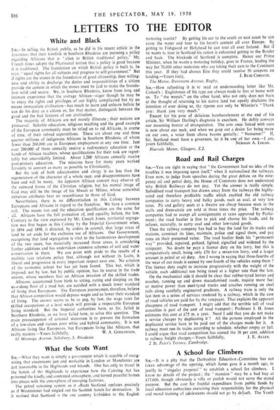LETTERS TO THE EDITOR
White and Black
telling the British public, as he did in his recent article in the Spectator, that their kinsfolk in Southern Rhodesia are pursuing a policy regarding Africans that is " alien to British traditional policy," Mr. Creech Jones adopts the Pharisaical notion that a policy is good because it is traditional. The foundation on which British policy is built is, he says, " equal rights for all subjects and progress to self-government." But if rights are the stones in the foundation of good citizenship, then willing- ness and ability to discharge the duties and responsibilities of a citizen provide the cement in which the stones must be laid to make the founda- tion solid and secure. We, in Southern Rhodesia, know from long and intimate experience that the average African—eager though he may be to enjoy the rights and privileges of our highly complicated but by no means immaculate civilisation—has much to learn and unlearn before he can do his duty as a citizen or, for that matter, distinguish between the good and the bad features of our civilisation.
The majority of Africans are not merely illiterate ; their notions are primaeval. Suitable education, religious teaching and the good example of the European community must be relied on to rid Africans, in course of time, of their inbred superstitions. There are about one and three quarter millions of indigenous. Africans in Southern Rhodesia, of whom fewer than 200,000 are in European employment at any one time. Just over 200.000 of them annually receive a rudimentary education at the hands of African teachers, whose qualifications for their task are regret- tably but unavoidably limited. About 1,200' Africans annually receive post-primary education. The missions have for many years worked fervently to convert as many as possible to Christianity.
But the task of both educationists and clergy is no less than the regeneration of the character of a whole race, and disappointments have been and will be many. An apparent African convert may observe all the outward forms of the Christian religion, but his mental image of God may still be the image of his Mwari or Mlimo, whose somewhat nebulous attributes bear no resemblance to those of God.
Nevertheless, there is no differentiation in this Colony between Europeans and Africans in regard to the franchise. We have a common roll. The means test and the education qualification are the same for all. Africans have the full protection of, and equality before, the law. Contrary to the view expressed by Mr. Creech Jones, territorial segrega- tion was first begun in this Colony by the Imperial Government when, in 1894 and 1898, it directed, by orders in council, that large areas of land be set aside for the exclusive use of Africans. Our Government, recognising that land segregation is vital to the harmonious development of the two races, has materially increased those areas, is considering further additions and has undertaken extensive schemes of soil and water conservation in them. We can point with pride to the results of a realistic race relations policy that, although not without its faults, is liberal and progressive in every important respect save one. No solution of the economic colour bar has yet been found. This bar, which is imposed, not by law, but by public opinion, has its source in the trade unions, whose members fear an African invasion of the skilled trades.
Africans, accustomed from birth to sitting, eating and sleeping on the ct"v-dung floor of a mud hut, are satisfied with a much lower standard of living than Europeans. The European journeymen, therefore, believe that African competition would depress wages and so lower their standard of living. The answer seems to be to peg, by law, the wage rates for skilled occupations at a level which will provide a respectable European living standard. But the Imperial authorities have, so far, failed in Northern Rhodesia, as we have failed here, to solve this question. The main preoccupation of colonial statesmen is to prevent the formation of a low-class and vicious poor white and hybrid community. It is not Africans living like Europeans. but Europeans living like Africans, that
really matters.—Yours faithfully, W. A. GODLONTON. 81 Montagu Avenue, Salisbury, S. Rhodesia.










































 Previous page
Previous page